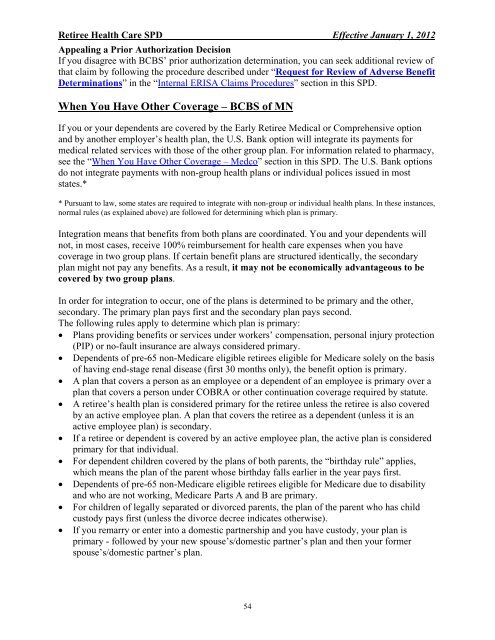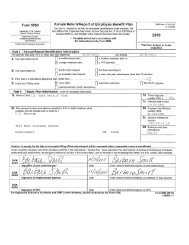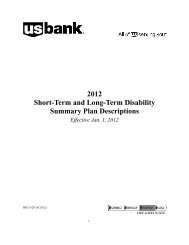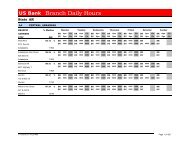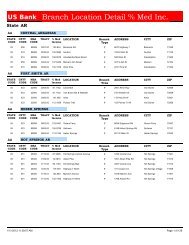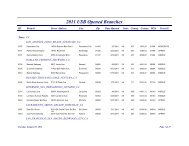The eligibility and enrollment rules for the U
The eligibility and enrollment rules for the U
The eligibility and enrollment rules for the U
Create successful ePaper yourself
Turn your PDF publications into a flip-book with our unique Google optimized e-Paper software.
Retiree Health Care SPD Effective January 1, 2012<br />
Appealing a Prior Authorization Decision<br />
If you disagree with BCBS’ prior authorization determination, you can seek additional review of<br />
that claim by following <strong>the</strong> procedure described under “Request <strong>for</strong> Review of Adverse Benefit<br />
Determinations” in <strong>the</strong> “Internal ERISA Claims Procedures” section in this SPD.<br />
When You Have O<strong>the</strong>r Coverage – BCBS of MN<br />
If you or your dependents are covered by <strong>the</strong> Early Retiree Medical or Comprehensive option<br />
<strong>and</strong> by ano<strong>the</strong>r employer’s health plan, <strong>the</strong> U.S. Bank option will integrate its payments <strong>for</strong><br />
medical related services with those of <strong>the</strong> o<strong>the</strong>r group plan. For in<strong>for</strong>mation related to pharmacy,<br />
see <strong>the</strong> “When You Have O<strong>the</strong>r Coverage – Medco” section in this SPD. <strong>The</strong> U.S. Bank options<br />
do not integrate payments with non-group health plans or individual polices issued in most<br />
states.*<br />
* Pursuant to law, some states are required to integrate with non-group or individual health plans. In <strong>the</strong>se instances,<br />
normal <strong>rules</strong> (as explained above) are followed <strong>for</strong> determining which plan is primary.<br />
Integration means that benefits from both plans are coordinated. You <strong>and</strong> your dependents will<br />
not, in most cases, receive 100% reimbursement <strong>for</strong> health care expenses when you have<br />
coverage in two group plans. If certain benefit plans are structured identically, <strong>the</strong> secondary<br />
plan might not pay any benefits. As a result, it may not be economically advantageous to be<br />
covered by two group plans.<br />
In order <strong>for</strong> integration to occur, one of <strong>the</strong> plans is determined to be primary <strong>and</strong> <strong>the</strong> o<strong>the</strong>r,<br />
secondary. <strong>The</strong> primary plan pays first <strong>and</strong> <strong>the</strong> secondary plan pays second.<br />
<strong>The</strong> following <strong>rules</strong> apply to determine which plan is primary:<br />
• Plans providing benefits or services under workers’ compensation, personal injury protection<br />
(PIP) or no-fault insurance are always considered primary.<br />
• Dependents of pre-65 non-Medicare eligible retirees eligible <strong>for</strong> Medicare solely on <strong>the</strong> basis<br />
of having end-stage renal disease (first 30 months only), <strong>the</strong> benefit option is primary.<br />
• A plan that covers a person as an employee or a dependent of an employee is primary over a<br />
plan that covers a person under COBRA or o<strong>the</strong>r continuation coverage required by statute.<br />
• A retiree’s health plan is considered primary <strong>for</strong> <strong>the</strong> retiree unless <strong>the</strong> retiree is also covered<br />
by an active employee plan. A plan that covers <strong>the</strong> retiree as a dependent (unless it is an<br />
active employee plan) is secondary.<br />
• If a retiree or dependent is covered by an active employee plan, <strong>the</strong> active plan is considered<br />
primary <strong>for</strong> that individual.<br />
• For dependent children covered by <strong>the</strong> plans of both parents, <strong>the</strong> “birthday rule” applies,<br />
which means <strong>the</strong> plan of <strong>the</strong> parent whose birthday falls earlier in <strong>the</strong> year pays first.<br />
• Dependents of pre-65 non-Medicare eligible retirees eligible <strong>for</strong> Medicare due to disability<br />
<strong>and</strong> who are not working, Medicare Parts A <strong>and</strong> B are primary.<br />
• For children of legally separated or divorced parents, <strong>the</strong> plan of <strong>the</strong> parent who has child<br />
custody pays first (unless <strong>the</strong> divorce decree indicates o<strong>the</strong>rwise).<br />
• If you remarry or enter into a domestic partnership <strong>and</strong> you have custody, your plan is<br />
primary - followed by your new spouse’s/domestic partner’s plan <strong>and</strong> <strong>the</strong>n your <strong>for</strong>mer<br />
spouse’s/domestic partner’s plan.<br />
54


